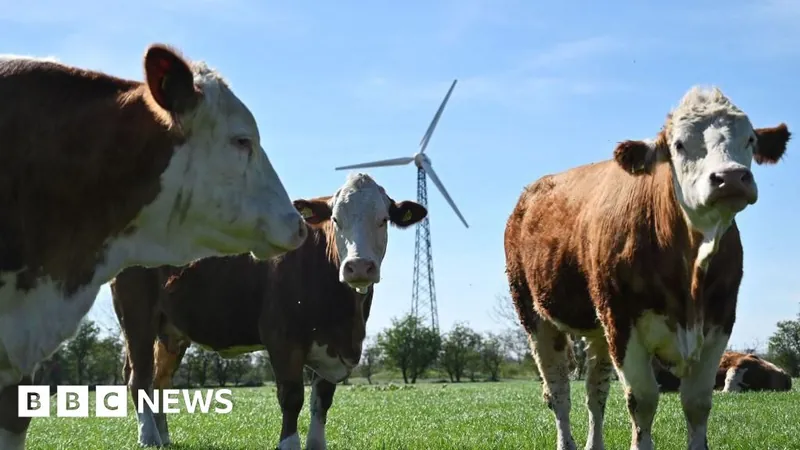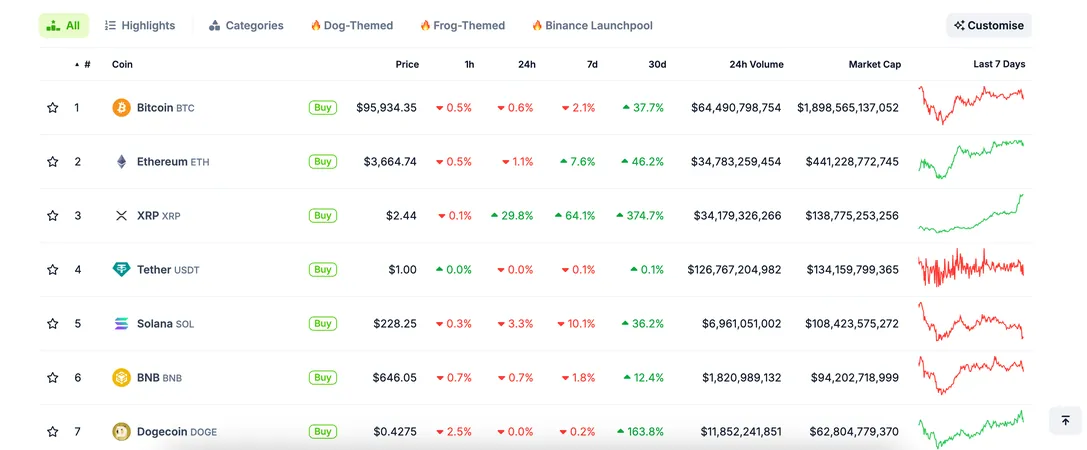
Denmark's Groundbreaking "Flatulence Tax": A Bold Move to Tackle Livestock Emissions
2024-11-19
Author: Wai
Introduction
Denmark is making headlines as it becomes the first country in the world to introduce a tax specifically targeting agricultural emissions from livestock, colloquially dubbed the "flatulence tax." This progressive step follows extensive negotiations between major political parties, farmers, industry leaders, trade unions, and environmental organizations. The initiative, known as the Green Tripartite agreement, was first disclosed in June and signals a commitment to addressing climate change.
Details of the Tax
Starting in 2030, farmers will be required to pay a levy of 300 kroner (approximately $43 or £34) for every tonne of methane emitted from livestock, including cows and pigs. This levy is projected to increase to 750 kroner by 2035. The Danish government hopes that this financial incentive will encourage farmers to adopt more sustainable practices.
Transformation of Agricultural Land
Jeppe Bruus, the Green Tripartite minister, emphasized the scale of the undertaking, stating, "It is a huge, huge task that is now underway: to transform large parts of our land from agricultural production to forestry and natural spaces." This transition aims to restore the natural ecosystems that have been impacted by extensive farming.
Targeting Nitrogen Pollution
As part of this ambitious Green Tripartite agreement, the Danish government is also targeting nitrogen pollution, with the goal of reducing emissions by 13,780 tonnes annually starting in 2027. This effort is crucial for restoring Denmark's coastal areas and fjords, which have suffered from nitrogen runoff due to agricultural activities.
Reforestation Initiatives
In conjunction with efforts to reduce emissions, Denmark is set to embark on a massive reforestation initiative. Reports indicate that the country plans to plant 250,000 hectares of new forest and restore 140,000 hectares of peatlands—which are vital carbon stores that have been converted for agricultural use—back to their natural habitat.
Agricultural Landscape
Currently, approximately 60% of Denmark's land is designated for agriculture, making it one of the countries with the highest percentage of cultivated terrain on the planet, alongside Bangladesh. Mr. Bruus remarked that the shift in Denmark's natural landscape will be unprecedented since the draining of its wetlands in 1864.
Collaboration and Global Impact
In discussing the significance of the agreement, Denmark's Minister for Climate, Energy and Utilities, Lars Aagaard, highlighted the nation's "willingness to act" and the importance of collaboration among stakeholders. He remarked, "This demonstrates the Danish model—a broad political majority in parliament and the inclusion of affected sectors and environmental stakeholders." Aagaard believes that global cooperation akin to Denmark's efforts is essential in the fight against climate change, urging other nations to follow suit.
Conclusion
With bold steps like this, Denmark is leading the way in climate action, proving that innovative solutions can make a substantial difference in the ongoing battle against global warming. Will other countries be inspired to adopt similar measures, or will they lag behind in this critical race against climate change? Stay tuned as this story unfolds!




 Brasil (PT)
Brasil (PT)
 Canada (EN)
Canada (EN)
 Chile (ES)
Chile (ES)
 España (ES)
España (ES)
 France (FR)
France (FR)
 Hong Kong (EN)
Hong Kong (EN)
 Italia (IT)
Italia (IT)
 日本 (JA)
日本 (JA)
 Magyarország (HU)
Magyarország (HU)
 Norge (NO)
Norge (NO)
 Polska (PL)
Polska (PL)
 Schweiz (DE)
Schweiz (DE)
 Singapore (EN)
Singapore (EN)
 Sverige (SV)
Sverige (SV)
 Suomi (FI)
Suomi (FI)
 Türkiye (TR)
Türkiye (TR)